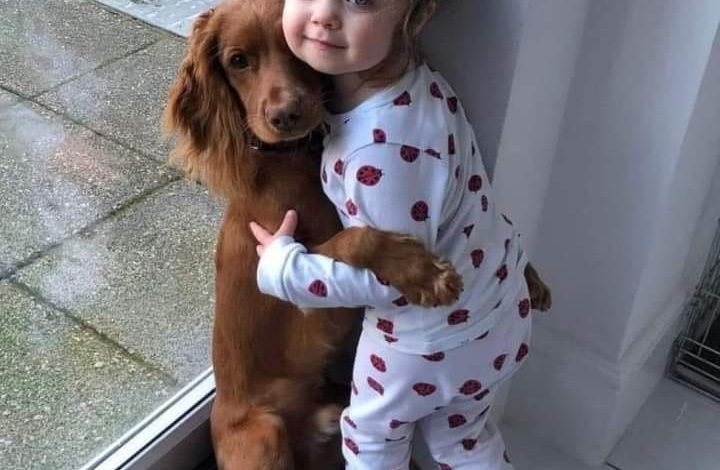
ADVERTISEMENT
The Unbreakable Bond Between Children and Dogs: A Friendship for Life
ADVERTISEMENT
Introduction
Few things in life are as heartwarming as the bond between a child and their dog. These friendships, which often begin in early childhood, are rooted in mutual love, trust, and a shared sense of wonder. The companionship between a young child and a loyal dog isn’t just cute; it offers profound benefits for both. Beyond the adorable moments, this bond can foster emotional development, empathy, and resilience in children while providing companionship and joy to the dog. Let’s explore why this unique relationship is so cherished and the lasting impact it can have on both child and pet.
1. Building Emotional Intelligence and Empathy
From an early age, children learn empathy and compassion through their interactions with dogs. By caring for and observing their pets, kids begin to understand emotions, body language, and the importance of being gentle. They learn to read a dog’s cues—whether the dog is happy, nervous, or in need of a hug—and respond accordingly.
This growing empathy extends beyond their pets, helping children understand and connect with other people’s emotions. Research has shown that children who grow up with pets are more likely to develop a strong sense of empathy and compassion, which benefits their social interactions throughout life. In a way, dogs become a child’s first teacher in understanding emotional nuance.
ADVERTISEMENT
2. A Constant Companion and Source of Comfort
For young children, a dog often becomes a constant friend who is there for them through every milestone. When a child feels sad, anxious, or overwhelmed, a loyal dog offers unconditional support, without judgment or demands. This companionship can provide comfort in times of stress, acting as a calming presence that reduces anxiety and promotes well-being.
The physical closeness of hugging or simply sitting next to a dog can trigger the release of oxytocin, often referred to as the “love hormone,” in both the child and the dog. This natural bonding hormone helps create a sense of safety and happiness, making children feel loved and supported. The presence of a dog can provide a sense of stability in a world that is often overwhelming for young kids.
3. Learning Responsibility and Routine
Having a dog helps children develop a sense of responsibility from an early age. Simple tasks like feeding, walking, and brushing the dog give children a role in taking care of another living being. These tasks introduce kids to the concept of routine and teach them about consistency and dedication.
ADVERTISEMENT
While parents typically guide younger children through these responsibilities, the act of participating in pet care fosters a sense of accomplishment and independence. As children grow, they take on more tasks independently, learning that caring for a dog is both a privilege and a responsibility.
4. Encouraging Physical Activity and Outdoor Play
In a world where children are increasingly glued to screens, having a dog encourages more outdoor activities. Walks, runs, and games of fetch become part of a child’s daily routine, helping them stay physically active and develop a love for nature. This interaction promotes a healthy lifestyle, as children who grow up with dogs are more likely to engage in outdoor play, even on chilly days.
These activities are beneficial not only for physical health but also for mental well-being. Spending time outside with a dog has been shown to reduce stress, improve mood, and boost energy levels. Children and dogs alike benefit from these shared adventures, creating memories that often last a lifetime.
5. Building Resilience Through Friendship and Loss
ADVERTISEMENT
The bond between a child and a dog is special but also finite. While this friendship teaches children about love and companionship, it also introduces them to the concept of loss. For many children, the death of a pet is their first experience with grief, offering an early, albeit painful, lesson in life’s impermanence.
Though difficult, this experience builds resilience and helps children develop coping mechanisms. Understanding that love comes with eventual loss teaches children about life’s natural cycle, fostering emotional maturity. Through both the highs and lows, the bond with a pet becomes a fundamental part of a child’s growth and understanding of relationships.
6. The Dog’s Role: An Unconditional Love That Fosters Trust
For dogs, their bond with a child is equally meaningful. Dogs are naturally loyal and nurturing, and they often form especially protective attachments to young children. This relationship gives dogs a purpose and a sense of belonging, as they recognize themselves as a vital part of the family.
The gentle patience of a dog, even when a child pulls its ears or hugs it tightly, demonstrates an extraordinary level of tolerance and affection. Dogs often instinctively protect children, watching over them and providing a level of companionship and trust that’s difficult to replicate. The love between a dog and a child is a two-way street, enriching the lives of both in profound ways.
7. Memories That Last a Lifetime
The memories created with a childhood dog stay with people for a lifetime. Many adults look back on their childhood pets with immense nostalgia and gratitude. The adventures, the cuddles, and the unwavering loyalty of a childhood dog leave an imprint that shapes a person’s relationship with animals, nature, and even other people.
The photos, stories, and memories of a child and their dog become treasured parts of family history. Years later, these memories often bring a smile, reminding adults of the unconditional love they experienced during their formative years.
Conclusion
ADVERTISEMENT
The bond between a child and a dog is one of life’s purest connections, built on love, trust, and shared experiences. This friendship offers children a sense of stability, compassion, and joy, while also giving dogs a trusted companion and a place in the family. Through the simple act of loving each other, children and dogs create a world of mutual support and affection, forming a relationship that’s both heartwarming and beneficial.
In a world where friendships can be fleeting, the bond between a child and a dog is refreshingly straightforward and enduring. It teaches lessons that go beyond words, showing that love doesn’t need to be complicated to be powerful. For every child who grows up with a loyal dog by their side, these memories are a lasting gift, reminding them of the beauty of connection, kindness, and loyalty.




